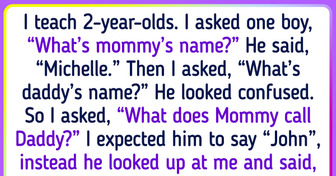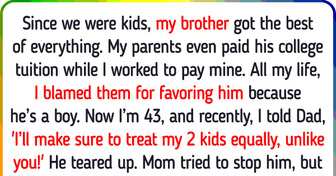6 Ways You Can Set Boundaries for Your Mother-in-Law
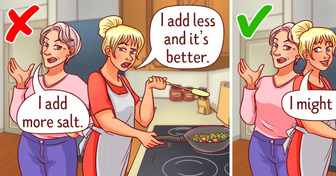
Parenting is all about using common sense and having discipline and patience, lots of patience. There are many moments when parents are put to the test, having to choose between listening to the opinions of others or respecting their children’s decisions, and that’s what we’ll be discussing today.
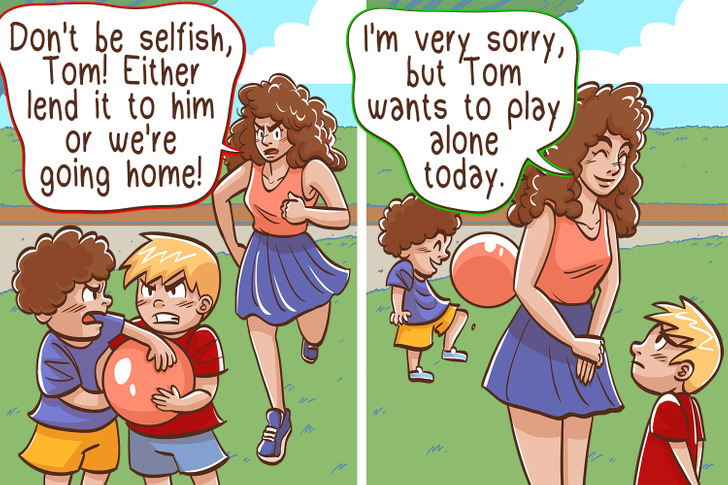
We all have personal things that we don’t like anyone else to use. Even at home, we usually have rules about the property of each member of the family: “Don’t play with mummy’s makeup” or “Don’t touch daddy’s computer.” This is how children learn that things have owners and that in the case of their toys, they are the owners.
If they do not want to lend them to other children they do not know, the right thing would be to respect their decision, and this does not mean that they are being selfish; they are acting instinctively and naturally, protecting their things from strangers. Don’t force or make your child feel bad for not wanting to lend something, or worse, because you don’t want to look bad.
Instead of lending their toys without their permission, try to get your child to meet the other kid: “Look, Tom, this is Martin, he goes to the same school as cousin Sara, and he would love to play with you. How about playing together?” If the answer is still “NO,” don’t be ashamed or make judgments against your child about it.
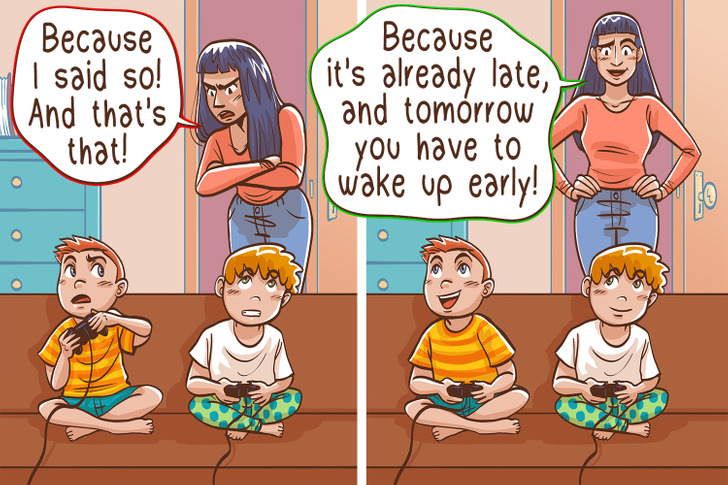
Although we adults have freedom of choice, our lives are also conditioned by rules and obligations that we have to comply with. We could choose not to comply with them if we want to, but we are aware that every decision has consequences. That is the big difference between being obedient and being submissive.
An obedient person decides to obey out of conscience and out of respect for others. Whereas a submissive person submits to others, either out of fear or out of obligation, without questioning the orders they receive. Our aim as parents is to educate our children so that tomorrow they will be obedient, but not submissive at the mercy of anyone.
Do not give orders to your children nor take their “Why?” as a confrontation. They really want and need to understand why they should or should not do certain things. It is important that they understand that they have the freedom to choose. But be consistent; if they don’t study, they won’t pass the exam and will have to study twice as hard to make it up, and if they don’t eat, they will feel weak and won’t have the energy to play or, even worse, they could get sick.

We often confuse affection with manners or politeness. When a child refuses to give a kiss or a hug, we immediately think that they will be labeled as “rude” or “lacking manners,” but one has nothing to do with the other. Good manners and politeness can be shown in many ways that are not linked to physical contact. The members of royalty, for example, are experts in etiquette and manners, but we rarely see them handing out kisses and hugs everywhere.
Hugs and kisses should be given only to those you love and when you wish to show your affection. They are tokens of love, and love cannot be forced or faked. So there is nothing strange (or bad) about not wanting to give a kiss to the lady at the bakery, or even to your grandmother, who lives in another city and whom you see at most twice a year. Respect their space and first of all ask: “Shall we kiss Grandma goodbye?”
If they don’t want to, you shouldn’t force them, pressure them, or play with their emotions to get them to do it with phrases like: “Oh, poor grandma, she’s going to leave very sad because you didn’t want to give her a kiss” or “Auntie is going to think you don’t love her, and she won’t want to come back anymore.” This is manipulation, and we should not allow anyone (including ourselves) to take advantage of our children’s innocence to make them do things they don’t want to do.
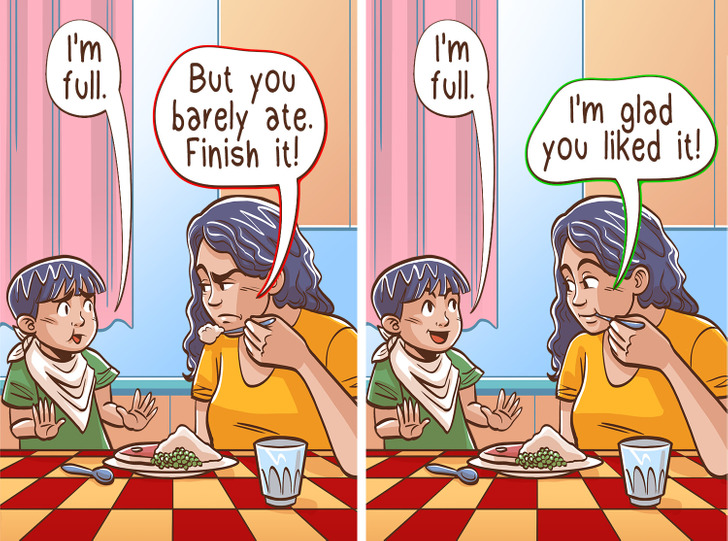
The natural thing to do would be to eat only when we are hungry, and we should eat enough to satiate ourselves, but there are so many things to do during the day that without organization and routine, we might not be able to get them all done. Mealtime, bedtime, bath time. The whole human body is designed to let us know when it needs food; even babies know this, so they cry to let us know it’s time to feed them.
For children, it is very important to adapt portion sizes and encourage healthy, varied, and balanced meals. It is also important to organize mealtimes so that there is enough space between meals to allow for hunger. If they have a snack at 7 p.m. and dinner at 9 p.m., the child probably won’t be hungry by dinnertime. Therefore, they will not want to eat or will eat less than expected.
If your child doesn’t want to eat at a certain time, don’t force them to eat. It is not unusual for them to feel hungry from time to time, as it also happens to adults. Skipping a meal will not harm your child. Some experts recommend “not to insist that our children eat something they don’t want, or to eat more than they want.”
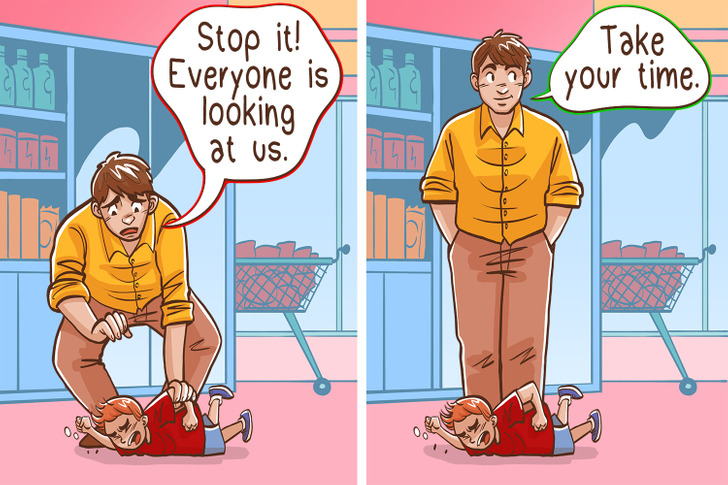
This is still a tough subject to deal with for some adults. Being aware of our emotions and learning to control them is no easy task. Children between 1 and 4 years of age do not have developed the parts of the brain that interact during emotional self-control, which is why it is so difficult for them to control themselves, and if they manage to do so, they do so with great effort.
When they are tired, physically or mentally, they become unbearable: they cry about everything, they are in a bad mood, nothing suits them, they are not even able to know what they want. And this is because they need a lot of energy to manage their emotions, and at that moment they don’t have it. When the child is in the middle of a tantrum, they will not listen to reason. Don’t try to shut them up, downplay their feelings, or make them repress them.
Even if it’s a stressful time, try to remain calm and patient so that when the storm passes and your child is receptive again, you can talk calmly about what happened. Invite them to tell you how they feel and listen to them carefully, without being judgmental about what they say. Make them understand that all the fuss they made didn’t change anything or help them get what they wanted, but that there are other more appropriate and effective ways to try to get what they want.
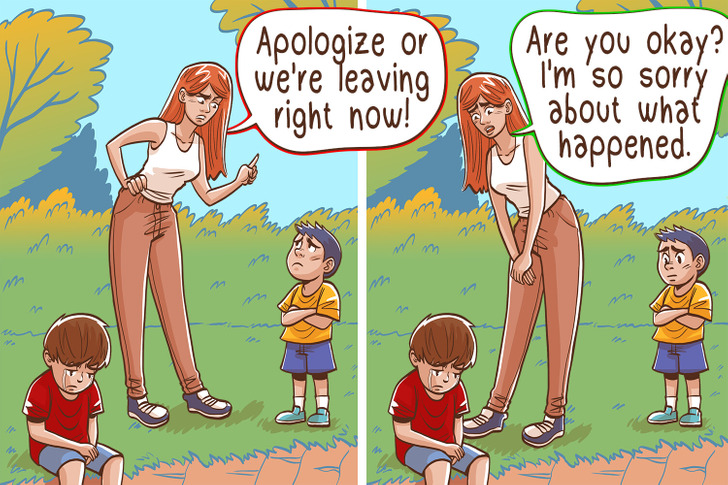
Children begin to develop their emotional intelligence from the age of 2. At first, all they will “understand” about emotions is what they feel or experience themselves, without being aware that others also have feelings. It is only from the age of 4 that they begin to develop empathy. It is impossible to feel guilty if we do not empathize with others.
If we force the child to apologize, they will probably do so, but without understanding why, or worse still, without guilt, which is the feeling that makes us want to apologize to others. This can have negative consequences, as it can lead the child to act as if after uttering that magic word, “sorry,” everything will be solved.
Act in an exemplary way by showing empathy and concern towards the victim: “Are you okay?” In turn, try to get the offender to take action as well: “What can we do to help?” or “Do you think he will feel better if we apologize?” If they do not want to apologize, later try to explain calmly and make them see what physical or emotional “wounds” they caused the other person.
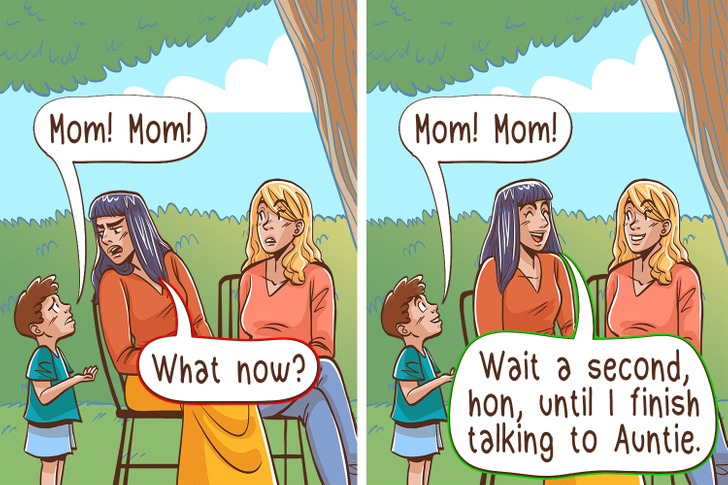
As soon as children begin to speak, they start interrupting us. Sometimes for unimportant things, sometimes not so much. It is completely natural and everyone does it at some point. We have to understand that this is not done “maliciously.” They are not aware of how annoying their interruptions can be.
As they get older, whether or not they continue to interrupt us will depend largely on us and the attention we pay to them. If every time our child comes running to us, we pay attention to them, all we do is reinforce that behavior, and even if at the end of the conversation we say, “And please don’t interrupt me again,” they will surely do it again.
If you don’t want that, stop paying so much immediate attention to them. If they insist, ask them to wait and continue your conversation. Teach them to control themselves, to interrupt politely, and to discern which situations have priority and which do not. For example: if they need to go to the toilet or if they are hurt, it would be acceptable to interrupt, but not if they just want to tell you that another child is wearing the same T-shirt.
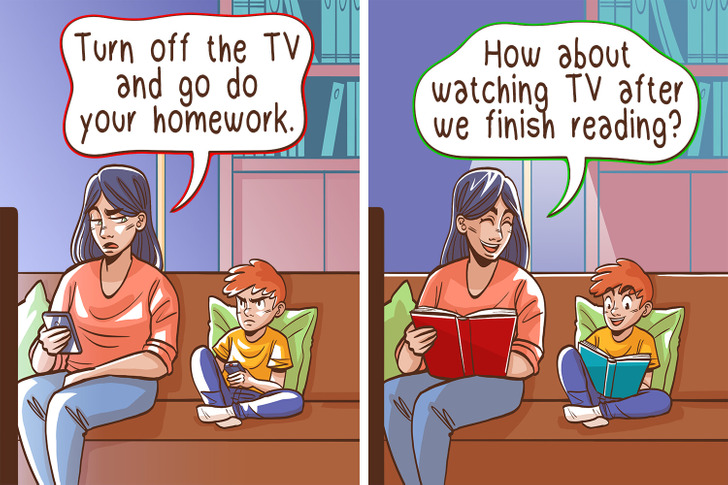
Children learn by imitation, everything they see and hear is their source of information. The whole family environment and those who have frequent contact with the child will be part of this process. Conflicts arise when one person asks for one thing, but another does something else, or the same person asks for something but sets a different example. For example: Mum caught John drinking directly from the bottle and scolded him, to which he replied “But Dad always does the same.”
Here there is a difference between the habits of mum and dad, where for one something is not right, but for the other it is normal. The same thing happens with “swear words.” We often hear our child say one and wonder where they learned it until one day we hear our partner say it. Or we might even say it when we accidentally hurt ourselves.
Don’t make your child feel bad for doing something they learned by imitating you. The adults should come to an agreement about how they want to raise their children and what they want to instill in them. Don’t argue about it in front of the child. Do not discuss this in front of your child, but in private. Once you have agreed on the guidelines, you will have to work together to correct what needs to be corrected.
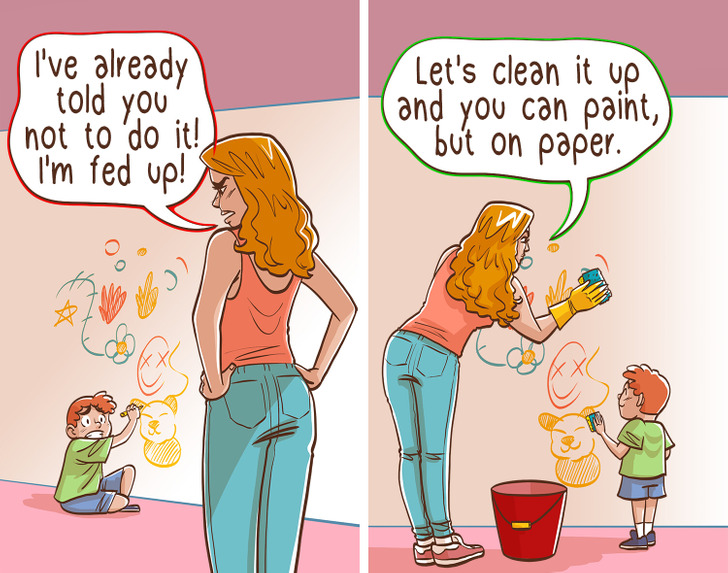
On the one hand, we may sometimes feel that our children are trying to drive us crazy, but nothing could be further from the truth. If they are small, under 6 years old, remember that they may not yet have developed their empathy, so they are not even aware of how you feel. On the other hand, we cannot hold anyone responsible for how we feel, as it is our feelings.
It is not uncommon to hear parents saying phrases such as: “You’re getting on my nerves,” “You’re exhausting my patience” or “You’re going to make me angry.” The adult is holding responsible a child who is not even capable of managing their own emotions yet. If this practice becomes habitual, it will have a very negative impact on the child’s emotional development.
That is why it is important that you start to take responsibility for what you feel and learn to manage it. When you feel your patience is wearing thin, take deep breaths or find tools to help calm down. It is impossible to be respectful and positive when you are nervous or angry, so until you are calm, it is best not to make important decisions.
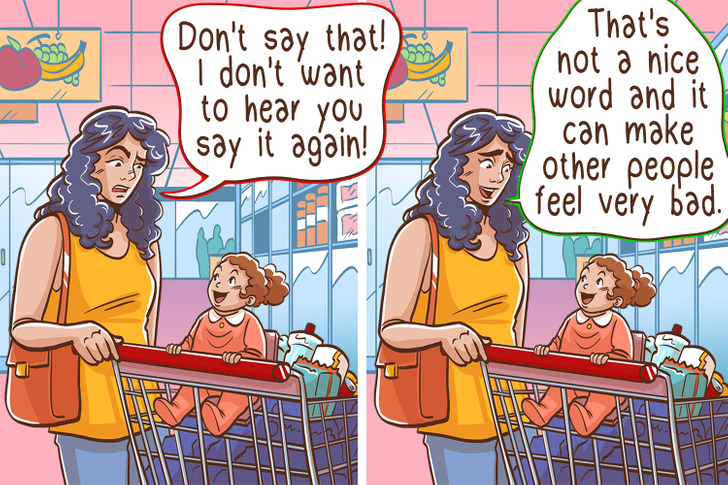
Without even seeing it coming, your adorable little creature will say a “bad word” in all their innocence, leaving you totally shocked. They will inevitably hear and repeat things they shouldn’t, not only at home, but also in the street, on TV, and even from older children at school.
The important thing in these cases is to know what to do so that everything remains a simple misunderstanding and “the word” disappears from the child’s usual vocabulary. First of all, don’t make a big deal out of it or scold your child. Keep in mind that they most likely have no idea of the meaning of what they’re saying.
Second, try not to smile or laugh when you hear it. If children think it is funny, they will keep repeating it. And finally, it is very important that you explain naturally why they should not keep saying it. Your child should know that it is an offensive and disrespectful word, which annoys and can even hurt the receiver.
Did you see yourself reflected in any of these points and what situation did it remind you of?








